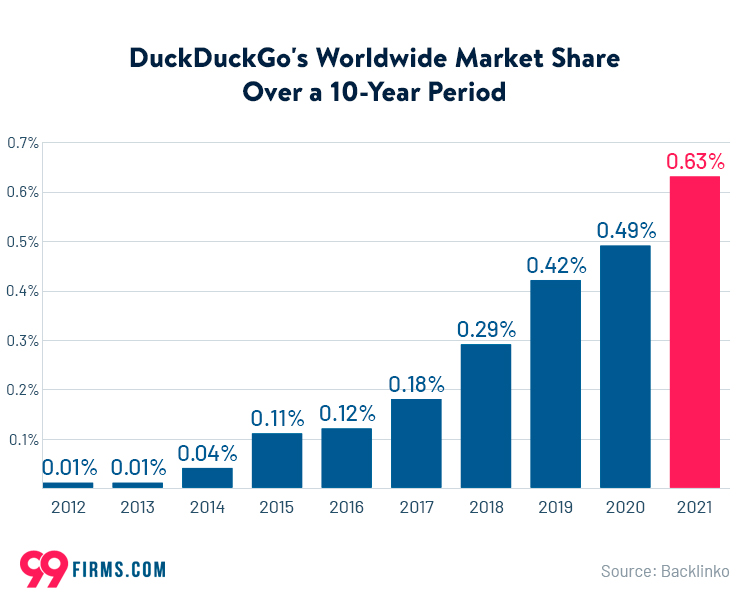
DuckDuckGo statistics prove that searchers no longer want to be profiled; they want real results. DuckDuckGo’s approach shows that search engines don’t need to collect data about their users to provide them with the information they seek. The search engine may not yet be a serious competitor in the game, but it jumped into hyperdrive after the recent media boom over online privacy. Here are the latest facts and figures on how this search engine challenger is quickly taking over the internet.
DuckDuckGo Statistics (Editor’s Choice)
- DuckDuckGo has about 80 million users.
- DuckDuckGo’s global search engine market share is 0.63%
- The estimated net worth of DuckDuckGo is $901 million.
- DuckDuckGo has received a total of $13 million in funding.
- DuckDuckGo’s annual revenue exceeded $100 million in 2020.
- DuckDuckGo employs 136 people.
- Over half of DuckDuckGo searches come from the US.
General DuckDuckGo Stats
1. DuckDuckGo turned 13 in February of 2021.
The DuckDuckGo history goes back to 2008 when Gabriel Weinberg founded the search engine. It is a “hybrid” platform, as it’s based on various vendors’ search APIs. It wasn’t until March 15, 2010, that it was decided that the search engine wouldn’t track search history. That was a revolutionary move that has proven to be the driving force of DuckDuckGo’s popularity.
(DuckDuckGo, Eyerys)
2. DuckDuckGo has received a total of $13 million in VC funding.
The company was self-funded until it got its first raise of $3 million in 2011. This funding was followed by a significant boost of $10 million in 2018 through their partnership with OMERS. With these funds, the company is set to continue growing and expanding its privacy protection policy worldwide. Based on these numbers, it is evident that the DuckDuckGo funding growth is directly proportional to the attention they’re getting.
(Crunchbase)
3. Roughly 80 million people use DuckDuckGo.
As the search engine doesn't track its users, it’s practically impossible to put together DuckDuckGo usage statistics in terms of user count. An educated guess is based on the average user making 30 searches per month or one per day. That accounts for approximately 80 million people based on the search engine’s average daily searches.
(DuckDuckGo)
4. DuckDuckGo has more than 10 million downloads from Google Play Store.
DuckDuckGo search engine has also been quite popular among mobile users. Since its launch, it has been downloaded more than 10 million times from the Android app store. While Apple’s app store does not disclose the all-time numbers, we know that the app received at least 400,000 downloads in February 2021 alone. It has excellent reviews on both stores, with a cross-platform average of 4.8/5.
(Backlinko)
5. DuckDuckGo employees have grown to 136.
While the number might seem small, given that the founder, Gabriel, was the sole employee until 2011, along with the fact there were only ten employees by 2014, DuckDuckGo stats point to a significant jump. What’s more, their website reveals that they are currently looking to fill at least ten open positions. With the growing popularity of the search engine, this number will likely grow considerably soon.
(DuckDuckGo)
6. DuckDuckGo holds 2.44% of the search market in the US.
DuckDuckGo statistics show that in 2019, the search engine passed the 1% mark in the US search market and is at 2.44% as of February 2021. The search engine’s market share has nearly doubled in just two years, demonstrating impressive growth.
(Statista)

7. 60% of internet users would strongly favor a privacy law against corporate misuse of personal data.
According to DuckDuckGo’s research, the majority of internet users would like Congress to take stronger action for protecting personal data against misuse by corporations, while only less than 7% oppose. Similar research from Pew showed that two-thirds of US citizens see more risks than benefits when it comes to data collection.
The firm has been actively pushing for stronger cyber privacy laws in the US and proposed a “Do-Not-Track” bill.
(Spread Privacy, Pew Research)
8. The average number of daily queries on DuckDuckGo has grown 9.17x since 2015.
DuckDuckGo usage statistics record steady growth in the number of searches between 2015 and 2020—until a dramatic jump happened between July 2020 and January 2021 from 63 million to 98 million searches a day on average. Since then, the search engine has routinely been used over 94 million times a day, sealing an established DuckDuckGo popularity.
(Backlinko, DuckDuckGo)

DuckDuckGo Advertising & Optimizing Stats
9. Cost per click on DuckDuckGo can be 10x cheaper than Google.
While it was cheaper, in this particular case, it also received 80% less click volume. Before hiring a PPC specialist, remember that customization and control will not be the same. The reason for the creation of the search engine was to protect users and their privacy from advertising abuse. With that said, their campaigns run through Bing and Yahoo.
(ShivarWeb)
10. The DuckDuckGo revenue exceeded $100 million in 2020.
The company has been profitable since 2014, but as of 2020, it hit a new high, closing the year with revenue of over $100 million, reducing its dependence on external investment. DuckDuckGo usage statistics further revealed that its apps were downloaded over 50 million times in the last 12 months—more than all prior years combined.
(TechCrunch, Spread Privacy)
11. DuckDuckGo put up 2,245 billboards across the US to promote its ‘offline’ approach.
As Google’s popularity decreased in the aftermath of the unprecedented antitrust penalty of $5 million handed out by the European Commission, DuckDuckGo has increased its advertising activities to promote its privacy-oriented stance. Suitably, they preferred OOTH advertising, appearing in over 4,500 locations in the US and Europe.
(Adzooma)
How DuckDuckGo is Growing and How the Future Looks
12. DuckDuckGo stats reveal a bounce rate of just 8.3%.
Bounce rate indicates the number of users who visited the website without clicking on any other pages besides the landing page. DuckDuckGo’s bounce rate is very low, especially when compared to Google’s 20.5%, meaning that the former has a better user engagement rate.
(Alexa)

13. DuckDuckGo is in the top five for all 31 countries using Android’s choice screen.
In response to the European Council’s 2018 Android decision to curb Google’s dominance on Android devices, Google started an auction system and allowed Android users to choose their own search engine upon installation. DuckDuckGo is one of the auction’s biggest winners; it appeared in the top five of all countries alongside Bing and Yahoo.
(Wired, Android)
14. Over 30% of adults in the US would change search engines over data privacy concerns.
Almost 35% of adults surveyed in the US cited not collecting any personal data from online activities as a motivation to change their preferred search engine. The numbers were similar for Australia, the UK, and Germany, according to DuckDuckGo statistics.
(Search Engine Journal)
15. Over half of the searches on DuckDuckGo come from the US.
DuckDuckGo demographics show that in August 2021, the highest percentage of users were from the US, at 50.9%. Germany follows behind at just 6%, and Japan is at just under 5%. These stats are no surprise, with the US having seen significant problems regarding online privacy and user information collection in recent years.
(Alexa)

16. DuckDuckGo has more than tripled its total worldwide search engine market share since 2017.
DuckDuckGo stats from 2017 show that the search engine’s global market share stood at only 0.18%. Today, it is below Yandex and has plenty to catch up with the other major search engines. However, DuckDuckGo’s total worldwide search engine market share has jumped to 0.63%. This is an impressive hike for just two years. Seeing the gradual growth, it won’t be long before the DuckDuckGo market share gap is at a minimum and the company increases its dominance among other search engines.
(Backlinko, Statcounter)

17. DuckDuckGo has a 2.42% share of the US mobile search market.
The search engine’s share in the mobile search market across the US has increased from 0.01% in 2013 to 2.42% in 2021, claiming second place from Yahoo (1.91%). The most dramatic increase happened between 2020 (1.52%) and 2021.
(Backlinko)

18. DuckDuckGo’s net worth is estimated at $904 million.
Based on the available DuckDuckGo stats about the daily, monthly, and annual revenue of the search engine, the estimated worth of the website is currently at $904 million. Once again, in the absence of any listed DuckDuckGo stock values and very little information about what visitors are doing, calculating the DuckDuckGo net worth is difficult. It can only be estimated based on the number of visitors alone and the search engine’s means of profit through advertising and affiliate marketing.
(Worth of Web)
19. DuckDuckGo usage rate sits at 201 in global internet traffic.
According to DuckDuckGo statistics from Alexa’s global internet and engagement ranking, the search engine currently sits in 201st place globally and 106th in the US. Google search statistics, unsurprisingly, point to Google’s dominance in the ranking as number one, while Bing sits at 28th.
(Alexa)
20. DuckDuckGo search queries have soared 165% over the last three years.
DuckDuckGo growth had picked up pace after 2018, the year when data privacy entered the public discussion at a large scale. With the launch of the European General Data Production Regulation (GDPR), the concerns were expressed in the US, leading to several high-profile lawsuits against data breaches, including that of Facebook.
(DuckDuckGo)
21. DuckDuckGo hit the record of nearly 105 million searches per day in February 2021.
The growing interest in privacy and security is clearly showing as DuckDuckGo continues to hit new high records. After Google announced them as an option in their default search engine list, the DuckDuckGo statistics we’ll be seeing will have even higher numbers.
(DuckDuckGo)
22. Only 17% of users think that tailored advertisements are ethical.
Although personalized experiences reveal an increase in activity and sales, users don’t seem to like it at the expense of their privacy. A study by the RSA shows that only 17% of users find tailored advertisements ethical, and only 24% think the same of customized news feeds—which explains DuckDuckGo’s popularity. Its usage has been growing significantly faster since the 2018 GDPR crisis.
(RSA, DuckDuckGo)
Wrap Up
From a grand idea born in a basement to a quickly growing search engine and advocate of user privacy, DuckDuckGo keeps gaining momentum. Although advertisers and users initially considered it was a very optimistic goal to set their sights at becoming a search engine leader, DuckDuckGo statistics show the search engine is constantly beating its own records. As people are becoming more aware of the privacy policies of DuckDuckGo, chances are the search engine will gain even more traction and keep producing even more staggering numbers.


